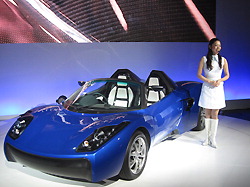Toray Industries’ Teewave AR1 carbon fiber concept car is seen at an event in Tokyo on Sept. 14. (Mainichi) Toray Industries, which got its start making rayon and is now the largest producer of carbon fiber. Teijin, another company that began in textiles, also presented a concept car based on carbon fiber in March this year. The two companies are beginning a major push to market carbon fiber to car companies as a serious substitute for the heavier steel-based designs of today. Even with a 200-kilogram battery, this car weighs 846 kilograms which is about half the weight of a comparable regular car.
The Teewave’s substructure is made of carbon-fiber-reinforced polymer — carbon fibre strengthened with a polymer resin — helping bring the total weight of the vehicle down to two-thirds that of current electric cars. The lower weight means it requires less electricity to run, which in turn can result in lower overall CO2 emissions.
Many carbon fiber parts, which weigh about one-fourth their steel equivalents but are 10 times stronger, are currently used in small-production-run sports cars and luxury vehicles. Their absence from the majority of road cars stems from carbon fiber parts’ high production cost — about 10 times that of steel parts — and the 10 minutes or more it takes to cast each part.
To bring down total costs, Toray decided to cast large, single parts incorporating what would normally be many smaller ones. The company also developed technology to bring the casting time below 10 minutes, and is aiming at reducing that to within three minutes. Toray believes that it will be able to produce cars in the 3 million yen [$35000] sticker price range by 2015.
Meanwhile Teijin, too, has been working on the casting time problem, developing its own casting technology using carbon-fiber-reinforced polymer that softens when heated, allowing for the world’s quickest casting at under a minute. The company unveiled a small two-seat concept vehicle based on the technology in March. The car’s frame, left unclad by body panels, was just 47 kilograms — one-fifth the weight of a steel frame of the same size.
Teijin projects that, with the global push to reduce CO2 emissions, the market for carbon-fibre-based vehicles will grow to around 4 million per year by 2020 [About 5-7% of all new cars].
“If car makers see value in this technology, we’ll reach mass production by 2013 or 2014,” Norio Kamei, head of Teijin’s carbon fiber and composite materials project group, told the Mainichi.
Toray, Teijin and Mitsubishi Rayon account for some 70 percent of the world carbon fibre market. According to private research firm Fuji-Keizai Group, in 2010 the automotive industry accounted for only about 3.4 percent of this market
Greencarcongress – Sumitomo Metal Industries Ltd. has developed technology capable of processing high-tensile steel tubes into auto bodies and slashing the weight by up to half. A new heat-treatment process makes it possible to form steel tubes into complicated shapes while at the same time makes the tubes 150% stronger.
DIC Corp. will build a production line for polyphenylene sulfide (PPS), a high-function resin, at its Kashima plant in Ibaraki Prefecture. PPS has been drawing greater attention as a lightweight alternative to metal. It is used in components around engines and control parts inside motors. DIC controls roughly 30% of the global PPS market. The new production line will have an annual capacity of 5,500 tons and become fully operational in 2015.
If you liked this article, please give it a quick review on ycombinator or StumbleUpon. Thanks

Brian Wang is a Futurist Thought Leader and a popular Science blogger with 1 million readers per month. His blog Nextbigfuture.com is ranked #1 Science News Blog. It covers many disruptive technology and trends including Space, Robotics, Artificial Intelligence, Medicine, Anti-aging Biotechnology, and Nanotechnology.
Known for identifying cutting edge technologies, he is currently a Co-Founder of a startup and fundraiser for high potential early-stage companies. He is the Head of Research for Allocations for deep technology investments and an Angel Investor at Space Angels.
A frequent speaker at corporations, he has been a TEDx speaker, a Singularity University speaker and guest at numerous interviews for radio and podcasts. He is open to public speaking and advising engagements.


